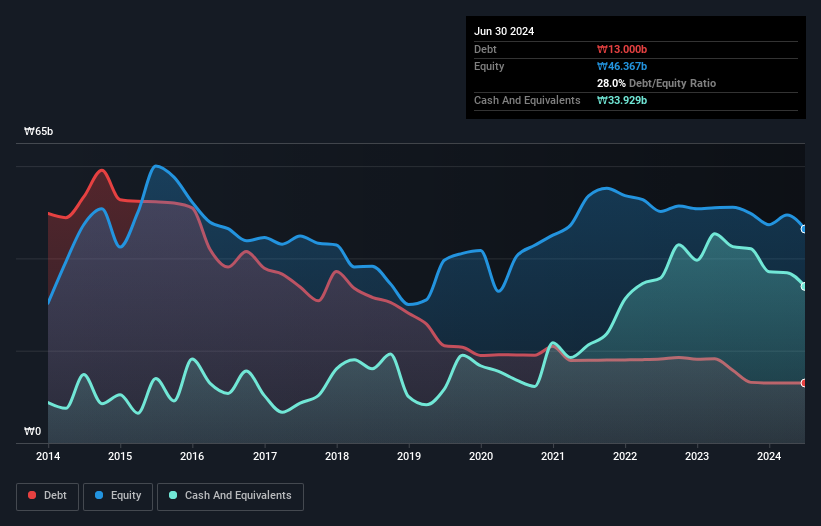
Howard Marks put it nicely when he said that, rather than worrying about share price volatility, 'The possibility of permanent loss is the risk I worry about... and every practical investor I know worries about.' So it seems the smart money knows that debt - which is usually involved in bankruptcies - is a very important factor, when you assess how risky a company is. As with many other companies SPECO Ltd. (KOSDAQ:013810) makes use of debt. But the more important question is: how much risk is that debt creating?
What Risk Does Debt Bring?
Debt is a tool to help businesses grow, but if a business is incapable of paying off its lenders, then it exists at their mercy. Part and parcel of capitalism is the process of 'creative destruction' where failed businesses are mercilessly liquidated by their bankers. While that is not too common, we often do see indebted companies permanently diluting shareholders because lenders force them to raise capital at a distressed price. Of course, the upside of debt is that it often represents cheap capital, especially when it replaces dilution in a company with the ability to reinvest at high rates of return. When we examine debt levels, we first consider both cash and debt levels, together.
View our latest analysis for SPECO
What Is SPECO's Net Debt?
The image below, which you can click on for greater detail, shows that SPECO had debt of ₩13.0b at the end of June 2024, a reduction from ₩15.7b over a year. However, its balance sheet shows it holds ₩33.9b in cash, so it actually has ₩20.9b net cash.

A Look At SPECO's Liabilities
We can see from the most recent balance sheet that SPECO had liabilities of ₩23.2b falling due within a year, and liabilities of ₩18.7b due beyond that. Offsetting these obligations, it had cash of ₩33.9b as well as receivables valued at ₩3.73b due within 12 months. So it has liabilities totalling ₩4.30b more than its cash and near-term receivables, combined.
Of course, SPECO has a market capitalization of ₩126.2b, so these liabilities are probably manageable. However, we do think it is worth keeping an eye on its balance sheet strength, as it may change over time. Despite its noteworthy liabilities, SPECO boasts net cash, so it's fair to say it does not have a heavy debt load! The balance sheet is clearly the area to focus on when you are analysing debt. But you can't view debt in total isolation; since SPECO will need earnings to service that debt. So when considering debt, it's definitely worth looking at the earnings trend. Click here for an interactive snapshot.
In the last year SPECO had a loss before interest and tax, and actually shrunk its revenue by 20%, to ₩23b. To be frank that doesn't bode well.
So How Risky Is SPECO?
By their very nature companies that are losing money are more risky than those with a long history of profitability. And in the last year SPECO had an earnings before interest and tax (EBIT) loss, truth be told. Indeed, in that time it burnt through ₩4.8b of cash and made a loss of ₩3.1b. But the saving grace is the ₩20.9b on the balance sheet. That means it could keep spending at its current rate for more than two years. Summing up, we're a little skeptical of this one, as it seems fairly risky in the absence of free cashflow. When analysing debt levels, the balance sheet is the obvious place to start. But ultimately, every company can contain risks that exist outside of the balance sheet. For example SPECO has 4 warning signs (and 3 which are concerning) we think you should know about.
When all is said and done, sometimes its easier to focus on companies that don't even need debt. Readers can access a list of growth stocks with zero net debt 100% free, right now.
New: Manage All Your Stock Portfolios in One Place
We've created the ultimate portfolio companion for stock investors, and it's free.
• Connect an unlimited number of Portfolios and see your total in one currency
• Be alerted to new Warning Signs or Risks via email or mobile
• Track the Fair Value of your stocks
Have feedback on this article? Concerned about the content? Get in touch with us directly. Alternatively, email editorial-team (at) simplywallst.com.
This article by Simply Wall St is general in nature. We provide commentary based on historical data and analyst forecasts only using an unbiased methodology and our articles are not intended to be financial advice. It does not constitute a recommendation to buy or sell any stock, and does not take account of your objectives, or your financial situation. We aim to bring you long-term focused analysis driven by fundamental data. Note that our analysis may not factor in the latest price-sensitive company announcements or qualitative material. Simply Wall St has no position in any stocks mentioned.
About KOSDAQ:A013810
SPECO
Manufactures and supplies asphalt plants for use in the road construction in South Korea and internationally.
Adequate balance sheet very low.
Similar Companies
Market Insights
Community Narratives



